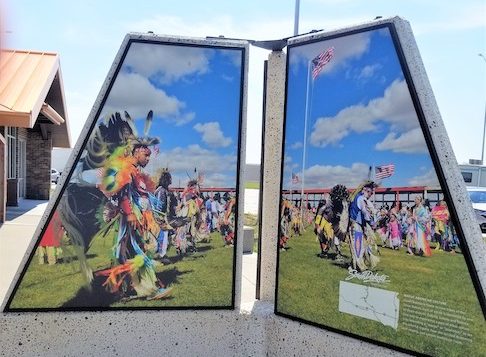News Based on facts, either observed and verified directly by the reporter, or reported and verified from knowledgeable sources.
Lower Brule Sioux Tribe seeks special election for fair voting in county
 I-90 rest-stop in Lyman County features Native American social dance photos. Photo by Talli Nauman
I-90 rest-stop in Lyman County features Native American social dance photos. Photo by Talli Nauman
The Lower Brule Sioux Tribe has asked a judge to nix balloting for Lyman County commissioners in South Dakota’s general elections this November. The tribal government wants a special election instead, contending that the local officials failed to remedy Voting Rights Act violations as ordered in its anti-discrimination lawsuit.
South Dakota U.S. District Chief Judge Roberto A. Lange ordered the county to come up with a “remedial plan” for electing its five, four-year commission seats. The Aug. 11 order is in answer to a May 18 complaint by the tribe and individual tribal citizens. The suit claims the commission’s 2022 redistricting ordinance timeline “was adopted with a discriminatory purpose.”
In response to the judicial order, the Lyman County Commission completed an amended version of its new two-district-voting plan during a meeting at Kennebec on Aug. 15. One of the districts would have two commission seats elected from a majority Native population base, as advocated by the tribe.

However, roll-out of the plan would not establish the district until the 2024 elections, according to the county ordinance amendment submitted for a court hearing on Aug. 23. “Commissioner elections held during the 2022 election cycle shall remain at-large.”
“Plaintiffs have waited too long to be denied relief for two more years,” Lower Brule argued in its brief for that hearing. “One more election using a practice that violates the Voting Rights Act, or the Constitution, is one too many.”
No Native Americans have ever been elected to the county commission under the at-large voting formula. That is despite constituting 47 percent of Lyman’s population, as Lower Brule Sioux Tribal Chair Clyde Estes testified during the first hearing on the case on July 26.
Canceling the 2022 tally is “the only equitable outcome that protects the 1,714 Native Americans in Lyman County who have for their entire lives waited for a voice on their county commission,” wrote lawyers for the tribe. If the at-large election proceeds, the Native-preferred commissioner candidates Stephanie Bolman and Ben Janis will lose, they said.
That’s because county-wide, the Native voting age population is “shy of a majority at 39.2 percent,” it noted. The county plan “has no potential to elect Native commissioners of choice before 2024. It, therefore, violates the VRA and is legally unacceptable.”
The judge called for cooperation. “If the county does not come forward with an appropriate remedial plan, this court can impose its own,” wrote Lange in the Aug. 11 order. “However, it would behoove the parties to work together to achieve a result that serves the competing concerns while remedying the VRA issue promptly.”
“Lyman County is a small county and, if demographic trends hold, is headed to a point where it could be evenly divided between Native American and non-Native American residents,” he said. “Cooperation between the tribe and the county, between tribal members and non-tribal members, is crucial to the future of Lyman County.”
Lower Brule Tribal Vice Chair Neil “Cody” Russell, who is among the individual plaintiffs, concurred.
“Genuine cooperation and timely action would achieve the adjustments needed to hold fair elections in Lyman County.”
Cody Russell to Buffalo’s Fire
Plaintiff candidates Bolman and Janis said the order had raised prospects for inclusivity in upcoming voting. “The judge ordered the county to work with the Lower Brule Sioux Tribe, and I hope they will take this opportunity as a fresh start to achieve a shared goal of preparing to hold fair 2022 elections,” Bolman told the Native American Rights Fund before the county revealed its response to the judge.
NARF Staff Attorney Samantha Kelty told Buffalo’s Fire that Lange’s order “acknowledges that everyone benefits when local governments cooperate with tribal governments like the Lower Brule Sioux Tribe.”
But in the end, the tribe lamented, “Instead of proposing an appropriate plan in cooperation … defendants unilaterally … bulldozed forward with adopting a plan.” The county failed to provide the tribe “proper notice” of its Aug. 15 ordinance amendment meeting. County officials also failed to deliver an advance copy of the proposed ordinance to the tribe’s lawyers, according to the brief.
In addition, county officials failed to solicit input from the tribe. And they did not respond to the tribe’s email offering to discuss remedies, lawyers told the judge. Instead, the county “submitted the ballots to the vendor for printing and drew the candidate ballot order to undermine any effort to achieve equitable relief this year,” they charged.
South Dakota law gives boards of county commissioners the responsibility of redistricting for commissioner elections after each decennial census. Defendants argue they need to keep the at-large system in place because “it is too close to the election to redress any VRA violation,” the judge noted.
Lange could order a special election in 2023, he said, observing that Lyman County budgets $25,000 per year for elections. County Auditor Deb Halverson testified the cost of any special election would possibly be $11,600. The judge took the arguments under advisement. He did not state a date for a decision.
NARF was the first among several voting rights advocates to come to the aid of the tribe in its unprecedented attempt to reform the county’s electoral districts.
References:
Additional legal representation in case: Los Angeles-based non-profit pro bono legal services provider Public Counsel and the firm of Manatt, Phelps, & Phillips LLP, also of Los Angeles, joined the tribe’s lawyers Randy Seiler and Bryan Sells on the case. Lyman County retained Sara Frankenstein, a partner of Gunderson, Palmer, Nelson & Ashmore in Rapid City, S.D.
Dateline:
SPEARFISH, S.D.
